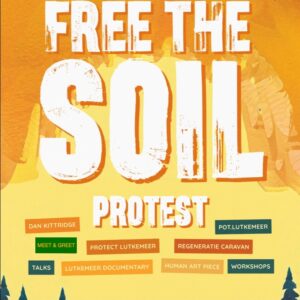
During yesterday’s Free the Soil Protest in the Lutkemeerpolder. Jeffrey Spangenberg delivered a powerful message to all in attendance. You can read his statement below.
Hello earthlings,
human and non-human.
Thank you for joining us today.
I am honored to stand before you and welcome you to Lutkemeer were we make a stand for
a safe, fair, and affordable food system,
especially for those who suffer form the system most.
Today is a special day,
Keti Koti,
Keti Koti, meaning “the breaking of chains” in Surinamese, is a commemoration of the abolition of slavery in the former Dutch colonies.
It serves as a poignant reminder of the deep scars inflicted upon countless lives
and the ongoing fight for justice and recognition.
There were some negative responses to letting our Free the Soil coincide with Keti Koti.
Some thought it was not appropriate.
So I like to grab the opportunity to discuss the profound connection between soil and Keti Koti.
Keti Koti is a powerful reminder of the intertwined struggles for justice, freedom, and equality.
Soil,
the very foundation of life,
sustains us all.
It is the cradle that nurtures our food, our communities, and our cultures.
It is a source of resilience and regeneration, holding the key to our collective survival.
Yet, throughout history, the exploitation and degradation of soil have mirrored the injustices inflicted upon marginalized communities.
The connection between soil and Keti Koti lies in the shared legacy of exploitation and the urgent need to rectify historical injustices.
Just as the rich soil was exploited for economic gain during colonial times,
so were the lives of countless enslaved Africans.
Their forced labor, suffering, and bondage were intrinsically tied to the extraction and exploitation of resources, including land and soil.
The profits derived from these cruel practices fueled the growth of empires and perpetuated systems of inequality that continue to affect us today.
But as we stand here today, we recognize that soil liberation and the struggle for justice are intrinsically linked.
Both require a commitment to dismantling oppressive systems and nurturing a more equitable and sustainable future.
We cannot truly liberate the soil without addressing the historical injustices that have ravaged communities and
perpetuated environmental degradation.
To free the soil, we must acknowledge the intergenerational trauma and economic disparities that continue to impact marginalized communities.
We must confront the legacies of colonialism and recognize the ongoing struggles for land rights and food sovereignty.
We must uplift and amplify the voices of those most affected by environmental racism and fight for environmental justice.
We must unchain ourselves form the neo-liberal chains.
Just as we work towards regenerative practices that restore soil health, we must also work towards healing and restoration within our societies.
By recognizing the connections between soil and Keti Koti, we commit ourselves to a vision of a more just and sustainable world.
It is a world where the soil is respected and nurtured, and where land rights are upheld.
It is a world where the chains of inequality are forever broken, and all people are afforded the freedom and dignity they deserve.
So let us stand together, soil activists and Keti Koti advocates, in solidarity and shared purpose.
Let us recognize the power of our collective voices and actions to bring about lasting change.
And let us work tirelessly to free the soil and forge a future that honors the dignity and rights of every living being.
Thank you, and may our united efforts lead us toward a world where soil and humanity thrive in harmony.